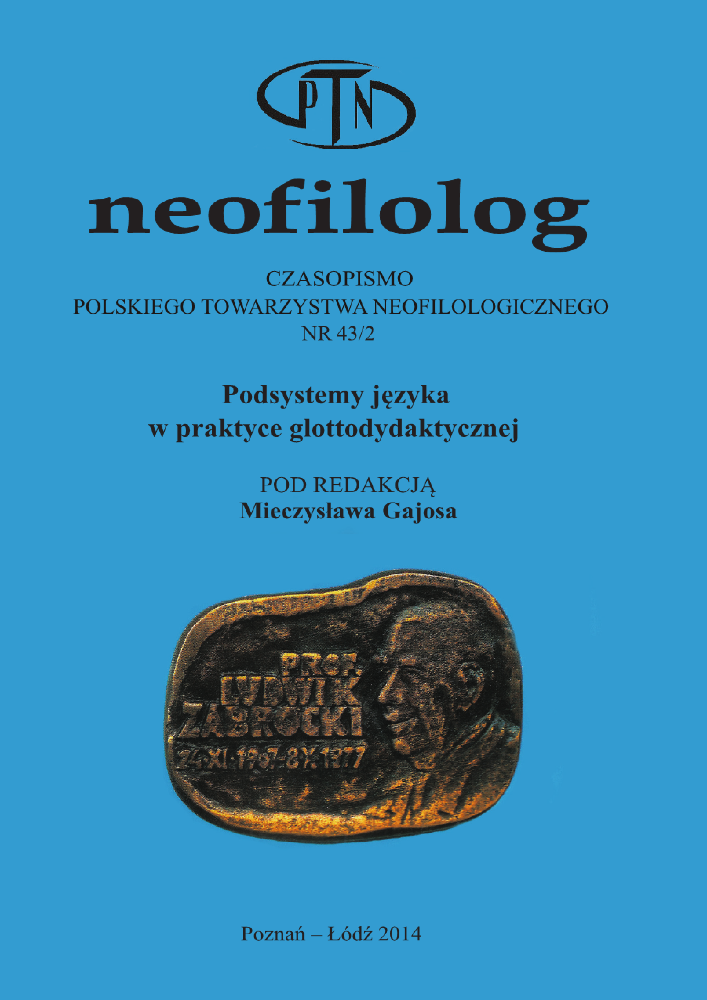Abstrakt
In this article I will concentrate on various techniques for learning and teaching vocabulary that support the memorizing of new words, and I will present the results of a survey conducted among students of applied linguistics on this topic. The main aim of this article is to verify the hypothesis that students haven’t yet been exposed to different techniques for effective vocabulary learning. First, I will show what the mental lexicon is and how it is organised. How mnemonists learn will also be discussed. Then I will briefly explain the terms ‘vocabulary’ and ‘lexical competence’ and show the important principles of vocabulary training. At the end, I will present the most important results of my survey (opinion poll).
Bibliografia
Andrzejewska, E. 2004. «Eigene Lernwege von Kindern beim Wortschatzerwerb im grundschulischen Fremdsprachenunterricht – Untersuchung zu Lernstrategien» (w) Sprachen lehren – Sprachen lernen. Nauczanie i uczenie się języków obcych. (red. C. Badstübner-Kizik, R. Rozalowska-Żądło, A. Uniszewska). Gdańsk: Wydawnictwo Uniwersytetu Gdańskiego: 176-189.
Baron-Cohen, S. i in. 2011. «Savant Memory in a Man with Colour Form Number Synaesthesia and Asperger Syndrome». Journal of Consciousness Studies 14, No. 9-10: 237-251.
Bethge, Ph. 2009. «Who Needs Berlitz? British Savant Learns German in a Week». Spiegel online: http://www.spiegel.de/international/germany/who-needs-berlitz-british-savant-learns-german-in-a-week-a-611381.html DW 20.07.2014.
Biedroń, A. 2009. «Czy neurologia ma zastosowanie w dydaktyce nauczania języków obcych?» (w) Problemy współczesnej dydaktyki języków obcych (red. M. Pawlak, M. Derenowski, B. Wolski). Poznań: Wydział Pedagogiczno-Artystyczny UAM: 29-38.
Bohn, R. 1999. Probleme der Wortschatzarbeit. Berlin, München: Langenscheidt.
Byrne, J. H. «Learning and Memory» Online: http://neuroscience.uth.tmc.edu/s4/chapter07.html DW 18.07.2014.
Collins, A. M., Loftus, E. F. 1975. «A Spreading-Activation Theory of Semantic Processing». Psychological Review 82: 407-428.
Czerniawska, E. 2003. «Nadzwyczajna pamięć (cz. 2). Pamięć, która nie przestaje zadziwiać – przypadek Szereszewskiego». Nowiny Psychologiczne 2/2003: 71-85.
Deese, J. 1959. «On the prediction of occurrence of particular verbal intrusions in immediate recall». Journal of experimental psychology 58(1): 17-22.
De Groot, A. M. B. 1993. «Word-type effects in bilingual processing tasks: Support for a mixed-representational system» (w) The Bilingual Lexikon (red. R. Schreuder, B. Weltens). Amsterdam: John Benjamins: 27-51.
Dong, Y., Gui, S., MacWinney, B. 2005. «Shared and separate meaning in the bilingual mental lexicon». Bilingualism: Language and Cognition 8: 221-238.
Gajos, M. 2010. Podsystemy języka w praktyce glottodydaktycznej. Łódź: Wydawnictwo Uniwersytetu Łódzkiego.
Gasparov, B. 2010. Speech, Memory, and Meaning: Intertextuality in Everyday Language. Berlin, New York: De Gruyter Mouton.
Handke, J. 1997. «Zugriffsmechanismen im mentalen und maschinellen Lexikon». Kognitive Linguistik und Fremdsprachenerwerb: Das Mentale Lexikon (red. W. Boerner, K. Vogel). Tübingen: Narr: 89-106.
Hulstijn, J. H. 1997. «Mnemonic methods in foreign language vocabulary learning: Theoretical considerations and pedagogical implications» (w) Second Language Vocabulary Acquisition. A Rationale for Pedagogy (red. J. Coady, T. Huckin). Cambridge: CUP: 203-224.
Huneke, H.-W., Steinig, W. 2002. Deutsch als Fremdsprache. Eine Einführung. 3. überarbeitete und erweiterte Auflage. Berlin: Schmidt.
Iluk, J. 1995. «Curriculare Entscheidungen zur Wortschatzarbeit in den Lehrplänen». (w) Aspekte der Wortschatzbeschreibung für Zwecke des Fremdsprachenunterrichts (red. J. Iluk). Katowice: Wydawnictwo Uniwersytetu Śląskiego: 7-21.
Klippel, F. 1995. «Wörternetze» (w) Erwerb und Vermittlung von Wortschatz im Fremdsprachenunterricht. Arbeitspapiere der 15. Frühjahrskonferenz zur Erforschung des Fremdsprachenunterrichts. (red. K.-R. Bausch, H. Christ, H.-J. Krumm). Tübingen: Narr: 101-107.
Kubiczek, A. 2012. «Fazy przetwarzania informacji językowych w nauce obcojęzycznego słownictwa». Neofilolog 39/1: 81-93.
Kurcz, I. 2000. Psychologia języka i komunikacji. Wykłady z psychologii. Warszawa: Wydawnictwo „Scholar”.
Legutko-Marszałek, I. 2013. «Kortikale und subkortikale Sprachareale im Lichte der neurokognitiven Sprachverarbeitungsmodelle». Glottodidactica XL/2: 21-33.
Lutjeharms, M. 2004. «Der Zugriff auf das mentale Lexikon und der Wortschatzer-werb in der Fremdsprache». Fremdsprachen Lehren und Lernen (FLuL) 33: 10-26.
Macedonia, M. 2013. „Fremdsprachen lernen mit Bewegung: Wie man natürlich und effizient lernt“ (w) Mehrsprachigkeit grenzüberschreitend: Modelle, Konzepte, Erfahrungen (red. G. Gombos). Klagenfurt: Drava Verlag: 115-130.
Michońska-Stadnik, A. 2008. «The effect of internal manipulation of environmental context imagery on vocabulary recall in English» (w) Perspektywy glottodydaktyki i językoznawstwa. Tom jubileuszowy z okazji 70. urodzin Profesora Waldemara Pfeiffera (red. K. Myczko, B. Skowronek, W. Zabrocki). Poznań: Wydawnictwo UAM: 254-174.
Müller, H. M. 2003. «Neurobiologische Aspekte des Fremdsprachenlernens» (w) Fremdsprachenlehren und Lernen 32. Jahrgang (red. G. Henrici, F. G. Königs, E. Zöfgen). Tübingen: Gunter Narr Verlag: 167-177.
Nation, P. 1993. «Vocabulary size, growth, and use» (w) The Biligual Lexicon (red. R. Schreuder, B. Weltens). Amsterdam: John Benjamins: 115-156.
Neveling, Ch. 2010. «Mentales Lexikon» (w) Metzler Lexikon (red. C. Surkamp). Stuttgart, Weimar: Metzler Verlag: 217-218.
Roediger, H. L., McDermott, K. B. 1995. «Creating false memories: Remembering words not presented in lists». Journal of Experimental Psychology: Learning, Memory, and Cognition 21 (4): 803-814.
Paradis, M. 2004. A Neuroliguistic Theory of Bilngualism. Amsterdam: John Benjamins.
Roche, J. 2008. Fremdsprachenerwerb. Fremdsprachendidaktik. 2. Auflage. Tübingen: Francke.
Rosch, E. 1978. «Prinicples of categorization» (w) Cognition and Categorization (red. E. Rosch, B. B. Lloyd). Hillsdale, NJ; NY: Lawrence Erlbaum: 27-48.
Smith, E. E., Shoben, E. J., Rips, L. J. 1974. «Structure and process in semantic memory: A featural model for semantic decisions». Psychological Review 81: 214-241.
Sökmen, A. J. 1997. «Current trends in teaching second language vocabulary» (w) Vocabulary: Description, Acquisition (red. N. Schmitt, M. McCarthy). Cambridge: CUP: 237-257.
Stork, A. 2003. Vokabellernen. Eine Untersuchung zur Effizienz von Vokabellernstrategien. Tübingen: Narr.
Targońska, J. 2011a. «Lexikalische Kompetenz – ein Plädoyer für eine breitere Auffassung des Begriffs». Glottodidactica XXXVII: 117-127.
Targońska, J. 2011b. «Słabo rozwinięta kompetencja leksykalna dorosłych – przyczyny, skutki i możliwości jej poprawy». Neofilolog 37: 55-71.
Licencja
Prawa autorskie (c) 2019 Gabriela Gorąca-Sawczyk

Utwór dostępny jest na licencji Creative Commons Uznanie autorstwa – Bez utworów zależnych 4.0 Międzynarodowe.
Przedstawiany utwór (artykuł) upubliczniany jest na podstawie umowy z autorem i na licencji Creative Commons Attribution-NoDerivatives 4.0 International (CC BY-ND 4.0).
Użytkownicy mają obowiązek podania wraz z rozpowszechnionym utworem, informacji o autorstwie, tytule, źródle (odnośniki do oryginalnego utworu, DOI) oraz samej licencji;
- bez tworzenia utworów zależnych,
- utwór musi być zachowany w oryginalnej postaci.
Uniwersytet im. Adama Mickiewicza w Poznaniu zachowuje prawo do czasopisma jako całości (układ, forma graficzna, tytuł, projekt okładki, logo itp.).
